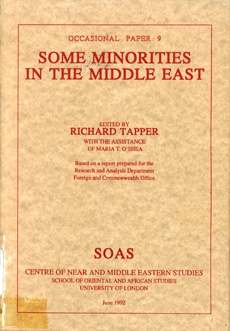
Some Minorities in the Middle East
Richard Tapper
SOAS
This introduction provides a short general background and suggests some of the comparative and theoretical issues which should be borne in mind when considering the position of minorities in the Middle East.
In the pre-modem Islamic Middle East, the issue of ‘minorities’ in theory concerned only religious minorities, and in particular non-Muslims. Even here, it should be noted that, for long periods in earlier Islamic history, non-Muslims constituted very much the majority of the populations of several polities, such as the early Caliphate and the early Ottoman Empire.
In Islamic society, Christians, Jews, and later, Persian Zoroastrians, became dhimmis, tolerated subordinate minorities with a recognized but inferior position. Dhimma is the relationship between the Muslim state and the dhimmi. Dhimma requires the State to protect the life and property of the dhimmi, exempt him from military service and allow him freedom of worship, while in return the dhimmi was expected to pay higher taxes in the form of the jizya poll tax, not to insult Islam, not to build new places of worship, and to dress in a distinctive fashion in order not to be mistaken for a Muslim. In civil and family law non-Muslims ... |